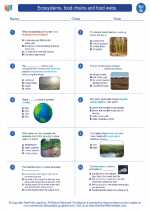Exoplanets
An exoplanet, or extrasolar planet, is a planet that orbits a star outside of our solar system. These planets can be found in various types of star systems and come in a wide range of sizes and compositions. The discovery of exoplanets has revolutionized our understanding of planetary systems and has raised intriguing questions about the potential for life beyond Earth.
Characteristics of Exoplanets
- Size: Exoplanets can range from smaller than Earth to larger than Jupiter.
- Composition: Some exoplanets are rocky like Earth, while others are predominantly made of gas or ice.
- Orbital Period: Exoplanets can have a wide range of orbital periods, from just a few days to thousands of years.
- Host Star: Exoplanets orbit various types of stars, including main sequence stars, red dwarfs, and even binary star systems.
Methods of Detection
Scientists use several methods to detect exoplanets, including:
- Transit Method: Observing the slight dimming of a star's light as an exoplanet passes in front of it.
- Radial Velocity Method: Detecting the wobble of a star caused by the gravitational pull of an orbiting exoplanet.
- Direct Imaging: Capturing actual images of exoplanets using powerful telescopes.
- Gravitational Microlensing: Observing the bending of light from a distant star by the gravitational influence of an exoplanet.
Potential for Life
One of the most exciting aspects of exoplanet research is the search for habitable worlds. Scientists look for exoplanets within the "habitable zone" of their host stars, where conditions may be suitable for liquid water to exist. The presence of water is considered a key ingredient for life as we know it, so identifying potentially habitable exoplanets is a major focus of exoplanet research.
Study Guide
To study exoplanets effectively, consider the following topics:
- Characteristics of exoplanets, including size, composition, and orbital properties.
- Methods used to detect exoplanets, such as the transit method, radial velocity method, and direct imaging.
- The concept of the habitable zone and its significance in the search for potentially habitable exoplanets.
- The implications of discovering exoplanets on our understanding of planetary systems and the potential for extraterrestrial life.
By understanding these key aspects of exoplanets, you can gain a comprehensive knowledge of this fascinating and rapidly evolving field of astronomy.
.◂Science Worksheets and Study Guides Seventh Grade. Ecosystems, food chains and food webs

 Activity Lesson
Activity Lesson
 Worksheet/Answer key
Worksheet/Answer key
 Worksheet/Answer key
Worksheet/Answer key
 Worksheet/Answer key
Worksheet/Answer key
 Vocabulary/Answer key
Vocabulary/Answer key
 Vocabulary/Answer key
Vocabulary/Answer key
 Vocabulary/Answer key
Vocabulary/Answer key
 Vocabulary/Answer key
Vocabulary/Answer key
 Vocabulary/Answer key
Vocabulary/Answer key
